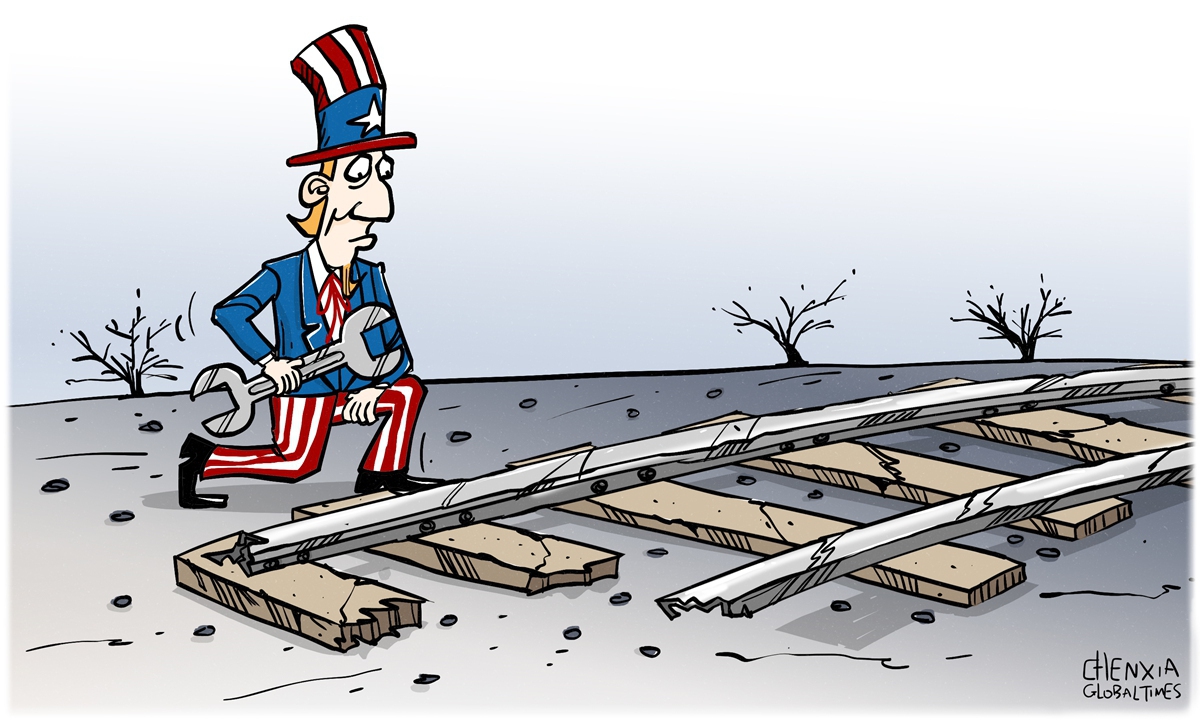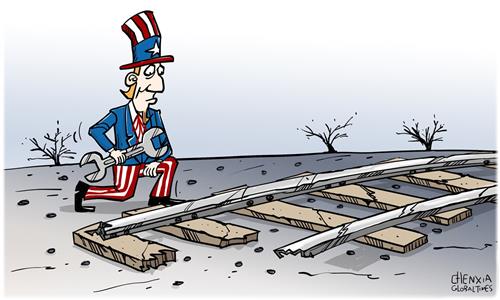
Illustration: Chen Xia/GT
The outbreak of the Israeli-Palestinian conflict has cast a shadow over the US' Middle East strategy. The India-Middle East-Europe Economic Corridor (IMEEC), which received Washington's support at the G20 summit last month, was once touted as a Western competitor to the China-proposed Belt and Road Initiative (BRI). US President Joe Biden called it a "really big deal," while European Commission President Ursula von der Leyen boasted of a "green and digital bridge across continents and civilizations." Indian Prime Minister Narendra Modi described the IMEEC as the "basis of world trade for hundreds of years to come." However, under the smoke of the Israeli-Palestinian conflict, this economic corridor now appears to be nothing more than a "castle in the air."The feasibility of establishing the IMEEC is very low, and the outbreak of the Israeli-Palestinian conflict has made this feasibility even smaller. The IMEEC is more of a political gesture. For the US, the fundamental purpose of building the IMEEC is to leverage the opportunity to win over Arab countries and achieve its own Middle East layout. The US also wants to engage in a great power competition with China and counter the BRI. If the current Israeli-Palestinian situation escalates and further causes a humanitarian crisis, then the US plan will be greatly affected. The current Israeli-Palestinian conflict has made everyone realize that without resolving the Palestinian issue, it is difficult to stabilize the Middle East.
The US is promoting the IMEEC in order to weaken China's influence in the Middle East, but this is just wishful thinking. Arab countries aren't willing to join the US-led confrontation between major powers. Li Weijian, a research fellow with the Institute for Foreign Policy Studies of the Shanghai Institutes for International Studies, told the Global Times that many countries would not be willing to participate in the IMEEC if it were to lead them back into geopolitical conflicts. Long Xingchun, a professor at the School of International Relations at Sichuan International Studies University, believes that in light of the achievements accomplished through the BRI cooperation, which has earned China international recognition and reputation, the US aims to dismantle China's platform by proposing alternative plans instead of genuinely desiring to establish an economic corridor.
In recent years, the US and the EU have proposed several plans to counter the BRI, such as "Build Back Better World" and "Global Gateway." However, it is easy to create new words, but these new words often lack follow-up and quickly fade away after gaining attention from the global media. Whether it is the US, the EU, or India, they all hope to increase their influence through the IMEEC opportunity. However, none of these three parties have sufficient infrastructure construction capabilities. The construction of the IMEEC relies on railways and ports, and India itself has poor infrastructure. The US and the EU also face difficulties in providing financial support for infrastructure projects. Long said that the IMEEC is like a smoke bomb, just a new term being used to attract attention. It's impossible to provide the Middle Eastern countries with an additional choice, added Long.
The IMEEC, like a "castle in the air," can only be used to "make empty promises," Li said. He believes that the Biden administration hopes to gain political resources by promoting this policy, but it doesn't consider whether this plan can be implemented in the long run. Additionally, it is impossible for the US to expect Middle Eastern countries to abandon cooperation with China and lean toward this unrealistic plan.
The motivation behind the IMEEC is questionable, as its ultimate goal is to create geopolitical conflicts and engage in geopolitical games. Many countries are aware of this. The BRI sincerely aims to provide infrastructure development and assistance to developing countries. China advocates for a global community of shared future and promotes cooperation and win-win development. If the US truly wants to promote development, it should not exclude cooperation with China. Whether it is the EU, India, or Middle Eastern countries, their participation in the IMEEC is primarily driven by their own national interests. In such a situation, it is impossible to politically align oneself solely for the sake of the IMEEC.

